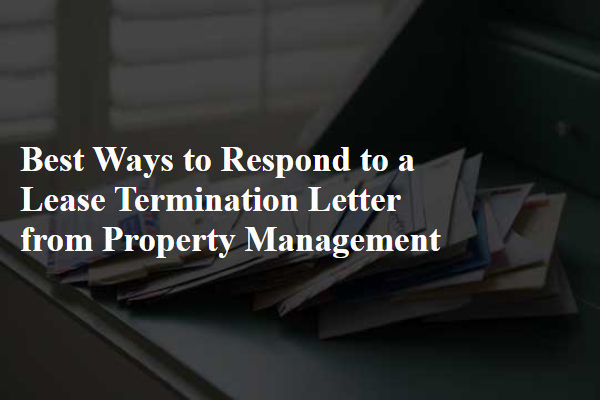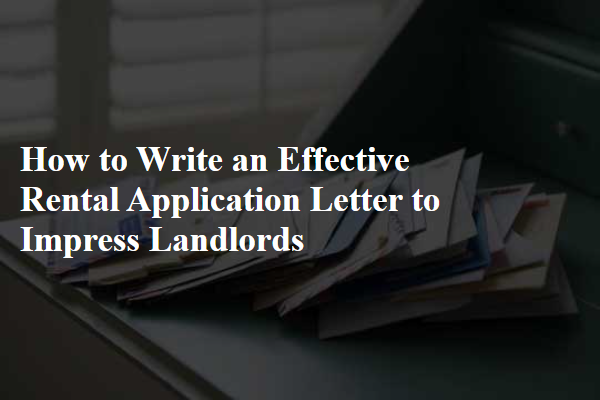
Carefully review the lease termination letter to understand the reasons and any stipulated deadlines. Communicate promptly with property management to clarify any questions and confirm your next steps. Prepare for a smooth move-out by documenting the property's condition and addressing any outstanding obligations.
Understanding Your Lease Termination Notice
| Step | Description |
|---|---|
| 1. Review the Lease Termination Letter | Carefully read the lease termination notice to understand the reason for termination, the effective date, and any conditions outlined by the property management. |
| 2. Verify Legal Compliance | Check local tenant laws to confirm that the termination follows legal guidelines, including proper notice periods and valid grounds for termination. |
| 3. Acknowledge Receipt | Send a formal written acknowledgment to the property management confirming receipt of the lease termination letter and your understanding of the notice. |
| 4. Evaluate Options | Consider negotiating with the property management if you need more time or if you believe the termination is unjustified. |
| 5. Plan for Move-Out | Organize your moving logistics including cleaning, repairing any damages, and scheduling an inspection to ensure a smooth handover of the property. |
| 6. Request Security Deposit Refund | Document the property's condition with photos and request the return of your security deposit according to the lease terms and local regulations. |
| 7. Seek Legal Advice if Necessary | Consult with a tenant rights attorney or local housing authority if you encounter unfair termination or need assistance with dispute resolution. |
Reviewing Your Lease Agreement Terms
How should tenants effectively respond to a lease termination letter from property management? Tenants must carefully review the termination notice for compliance with local laws and the lease agreement terms. Prompt written communication to acknowledge the receipt and clarify any misunderstandings ensures a smoother transition.
What key information should be included in a response to a lease termination letter? The response should state the tenant's understanding of the termination date and outline plans for vacating the property. Including requests for inspection dates or details about returning the security deposit helps protect the tenant's rights.
Why is it important to keep copies of all correspondence related to a lease termination? Maintaining records of letters and emails safeguards against disputes and provides evidence of timely communication. Documentation supports tenant claims if disagreements arise over lease termination terms.
How can tenants negotiate or request extensions after receiving a lease termination notice? Tenants can politely ask for additional time by explaining their circumstances and proposing a realistic move-out date. Property managers may grant extensions depending on lease policies and current property demand.
What steps should tenants take after agreeing to a lease termination? Tenants should arrange for a final walkthrough with property management to document the property's condition. Proper cleaning and repairs can help ensure the full return of the security deposit and close the tenancy smoothly.
Clarifying the Reason for Termination
Responding effectively to a lease termination letter from property management ensures a smooth transition and protects tenant rights. Understanding key steps can help tenants address concerns and negotiate terms confidently.
- Review the Lease Agreement - Carefully analyze termination clauses to confirm the validity and conditions of the lease termination.
- Communicate Promptly - Contact property management immediately to clarify reasons and discuss potential options or extensions.
- Document Everything - Keep written records of all correspondence and notices to maintain evidence for any future disputes.
Taking organized, timely action helps tenants respond appropriately and safeguard their interests during a lease termination.
Confirming Legal Compliance of Termination
Responding effectively to a lease termination letter from property management is crucial for a smooth transition. Clear communication and understanding your rights can prevent potential disputes and ensure proper closure of your tenancy.
- Review the Lease Agreement - Carefully analyze your lease terms to confirm the legality and notice period of the termination.
- Communicate Promptly - Respond in writing to acknowledge receipt and clarify any uncertainties with property management.
- Document Everything - Keep copies of all correspondence and records related to the termination for future reference or disputes.
Requesting an Extension or Negotiation
Responding effectively to a lease termination letter from property management is essential to protect your rights and ensure a smooth transition. Timely and clear communication can prevent misunderstandings and legal complications.
- Review the Lease Agreement - Carefully examine your lease terms to understand the grounds and notice period for termination specified by the landlord.
- Document Your Correspondence - Keep written records of all communications with property management to maintain evidence of your responses and agreements.
- Seek Legal Advice if Needed - Consult a tenant rights expert or attorney to clarify your position, especially if the termination seems unjust or violates local landlord-tenant laws.
Preparing a Written Response to Property Management
Responding promptly to a lease termination letter from property management is crucial to ensure clear communication and avoid potential legal issues. Carefully review the termination notice to understand the reasons and deadlines specified.
Compose a polite and professional response acknowledging the receipt of the letter. Address any concerns, confirm your intentions regarding the move-out date, and request further details if necessary.
Documenting All Communications
Responding promptly to a lease termination letter from property management is crucial to protect your tenant rights and avoid unnecessary fees. Review the terms of your lease agreement carefully to understand your responsibilities and any potential penalties.
It is important to acknowledge the letter in writing, confirming your receipt and understanding of the lease termination date. Consider negotiating with property management if you need more time to vacate or require clarification on move-out procedures.
Assessing Your Rights and Responsibilities
Responding promptly and professionally to a lease termination letter from property management is crucial to ensure clear communication and protect your rental rights. Understanding the reasons for termination and your legal obligations helps facilitate a smoother transition.
Start by carefully reviewing the lease termination letter to confirm the termination date and any specific instructions provided. Acknowledge receipt of the letter in writing, expressing your intention to comply or discuss any concerns. If needed, seek clarification or negotiate terms to address personal circumstances or disputes.
Planning Your Next Steps and Moving Arrangements
Respond promptly to a lease termination letter by carefully reviewing the terms and confirming the notice period required by your lease agreement. Communicate clearly with property management to discuss any discrepancies or to negotiate possible extensions if needed. Document all correspondence and maintain a record of conversations to protect your rights and facilitate a smooth transition.
Seeking Legal Counsel if Necessary
Responding promptly to a lease termination letter from property management is essential to maintain clear communication and avoid misunderstandings. Acknowledge the receipt of the letter, confirm your move-out date, and inquire about any move-out procedures or final inspections. Keeping a written record of all correspondence ensures protection of your rights during the lease termination process.



Comments